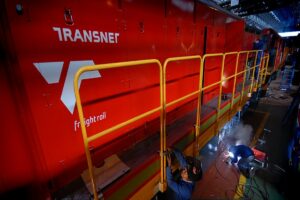In a significant development impacting South Africa’s crucial rail infrastructure, state-run ports and rail company TRANSNET has withdrawn its call for private-sector bids on the key SA rail corridor. This critical transport artery spans from the Durban ports to Johannesburg and Pretoria, serving as a lifeline for the transportation of millions of Rands worth of products and raw materials each month.
TRANSNET initially issued calls for private-sector partnerships for the key SA rail corridor in January 2023. However, recent reports from Engineering News reveal that the company has retracted its request for quotes from the private sector, shortly after securing National Treasury approval for a substantial R47-billion support package. The key SA rail corridor holds immense strategic importance, connecting the nation’s largest port with its industrial and economic hub. This corridor facilitates the movement of goods and materials crucial to the country’s economic activities. Despite its significance, the project has faced challenges, leading to the withdrawal of private bids. Changes in the transport policy, particularly reforms outlined in the National Rail Policy and Economic Regulation of Transport Bill, have impacted the key SA rail corridor project. The new regulations necessitate a review of the process for involving private companies and call for a clear separation of rail operations from infrastructure.“Transnet is fully committed to increasing private-sector partnerships on the key SA rail corridor, but believes it is necessary to complete the process of bringing the freight-rail ecosystem in line with national policy before taking any further steps to do so,” stated the state-owned enterprise (SOE).
The decision to withdraw private bids comes in the wake of challenges faced by the country’s rail system. Reports highlight significant delays in PRASA’s long-distance Shosholoza Meyl passenger trains, attributed to poor infrastructure. Concerns have been raised by the public regarding the need for thorough testing of tracks and infrastructure before putting them into service. South Africa’s port, pipeline, and freight rail system operator, TRANSNET, has struggled with financial challenges, accumulating a staggering R130 billion in debt due to years of mismanagement and corruption, according to Bloomberg. The key SA rail corridor, catering to coal, iron ore, new vehicles, and container shipments, has also deteriorated along with the financial troubles. Despite the setbacks, many major companies are advocating for private-railway operators as a viable solution to revitalize and improve the key SA rail corridor. The withdrawal of private-sector bids reflects TRANSNET’s commitment to aligning its operations with national policy, ensuring a more sustainable and efficient freight-rail ecosystem for the future. As the nation navigates these challenges, the role of private partnerships remains a critical aspect of the ongoing transformation of South Africa’s rail infrastructure.






